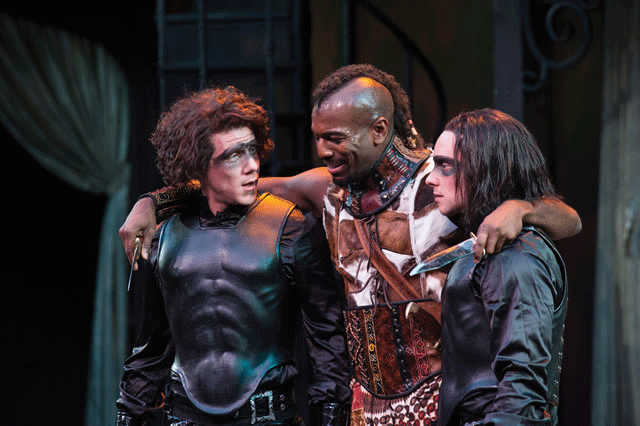
Chiron, Aaron, and Demetrius shoot the breeze.
To remind you of where we were when we left off (and I absolutely understand if you can’t remember back that far), the defeated queen of the Goths, Tamora, has managed to wrangle her way from enslaved prisoner to empress in a matter of a little under 500 lines of text. Not bad going. The first act closes with various characters’ sons being killed off and various undercurrents of revenge-to-be-exacted rippling through proceedings. We’ve already established that this is to be a particularly bloody play and it’s started promisingly. Now it’s time to focus attention on Aaron, Tamora’s irredeemably evil bit-on-the-side.
Aaron opens the second act alone on stage, soliloquying his devious little heart out about his ladyfriend’s recent change in fortune. Aaron sees in her elevation an opportunity for him to live it up and, though Tamora is now the first lady of the Roman Empire, he has no intention of letting this get in the way of his position as first cuckolder. His speech is full of intimations of how he is going to “arm [his] heart and fit [his] thoughts / To mount aloft with [his] imperial mistress, / And mount her pitch whom [he] in triumph long / Has prisoner held fettered in amorous chains”. So Tamora’s high social standing isn’t the only thing he’ll be climbing onto, am I right? Am I right? This is Aaron through-and-through: pragmatic and scheming and totally self-interested; not jealous of his lover’s husband-to-be, but welcoming of him as a means to his own lofty end.
The sexual politics don’t stop there, however. Aaron’s alone time is interrupted by Tamora’s two surviving sons bursting on stage in the middle of an argument with the delightful stage direction “Enter CHIRON and DEMETRIUS, braving” – people don’t brave with each other nearly enough anymore. The theme of their quarreling is Titus’ daughter, Lavinia, whom both of them want to “achieve”. Lavinia, remember, is engaged to Bassianus, the emperor’s brother (having been briefly engaged to the emperor himself for about 30 lines in the previous scene). Were it ever in any doubt that Lavinia is no more than a unit of exchange to these men, Demetrius makes it plain:
DEMETRIUS: Why makes thou it so strange?
She is a woman, therefore may be wooed;
She is a woman, therefore may be won;
She is Lavinia, therefore must be loved.
Charming. In a fit of enormous hypocrisy, Aaron initially warns them against sleeping with the wife (read “property”) of a Roman man, as he reminds them “Know ye not in Rome / How furious and impatient they be / And cannot brook competitors in love?” Well, quite. But no sooner has he scolded them for fighting over another man’s woman than he comes up with a solution to their problem that’s, well, morally dubious at best: instead of fighting over Lavinia, why don’t you both have her? Bros before hoes, man. Why don’t you go to a forest outside the city where she’s known to walk, lie in wait, and both take turns on her to your rapey hearts’ content? In fact, why don’t we ask Tamora for advice on how best to go about ensuring this comes off well? Yes, that’s right, let’s ask your mother – my girlfriend – what might be the best way her sons can gang-rape her future sister-in-law? Doesn’t that sound like a lovely idea, a real family enterprise?
They both agree, and the three of them head off to tell Tamora. They’re an adorable bunch, really.
In a flourish of racy foreshadowing, Aaron argues in favour of the forest as the rapists’ venue-of-choice as “The palace [is] full of tongues, of eyes and ears, / The woods are ruthless, dreadful, deaf, and dull.” By the end of the play, the woods won’t be the only thing missing a few sense organs.
It’s all a bit much to take, to be perfectly honest, but, if nothing else, this scene has taught us that early modern Londoners used the terms “I’d hit that” and “snatch” in hilariously smutty ways, and for that alone we should be grateful.








![Listed in 'The Persons of the Play' as EDWARD, Earl of March [...] later Duke of York and KING EDWARD IV.](https://i0.wp.com/upload.wikimedia.org/wikipedia/commons/4/4d/Edward4.jpg)


